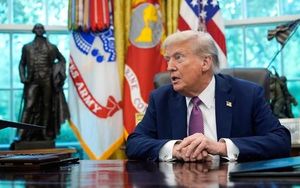Amid rising tensions and fierce competition between the United States and China, Taiwan's semiconductor industry finds itself at the center of geopolitical maneuvering. This dynamic is pivotal not just for Taiwan, but for the global tech ecosystem as it gears up for what many are calling the "great chip competition." The tussle for semiconductor supremacy encapsulates much more than simple market rivalry; it reflects deep-seated concerns about national security, technological sovereignty, and economic resilience.
Over the past few years, the rivalry between the U.S. and China has escalated from trade disagreements to all-out strategic competition, particularly focused on the tech sector. Both nations are now aggressively pursuing plans to secure their semiconductor supply chains, with initiatives like the U.S. CHIPS Act aiming to bolster domestic chip production and China's "Made in China 2025" pushing for self-sufficiency. This has left nations like Taiwan, which plays a significant role in semiconductor manufacturing, holding considerable sway.
Taiwan holds the crown when it relates to advanced chip production, contributing to approximately 90% of the world’s most sophisticated semiconductors. This dominance gives it unparalleled leverage, especially as global demand for chips continues to soar. For the U.S., Taiwan is not just another trading partner; it is seen as a bastion of supply for high-tech components, and Washington's strategy is increasingly centered around safeguarding this collaboration. The U.S. government’s commitment to Taiwan's semiconductor industry isn’t merely about trade; it's about maintaining technological superiority over China.
Indeed, the semiconductor industry operates on razor-thin margins and increasing complexity, making it ripe for disruption. Control over advanced chips is believed to be integral—not only to consumer products, like smartphones and computers—but also for military applications, including advanced weaponry and artificial intelligence platforms. So, it’s no wonder Taiwan has become fixed at the center of U.S. strategic interests.
Yet, the geopolitical climate cannot be overlooked. Trade barriers and tariffs have become commonplace as the U.S. looks to limit its economic exposure to China. Certain Taiwanese companies now find themselves walking on eggshells, balancing the expectations of their home government with the imperative to preserve trade relations with the U.S. and other Western nations. This precariousness was highlighted when reports emerged of SpaceX seeking to shift some of its production outside Taiwan—an action interpreted as cautious maneuvering amid rising tensions.
Over the years, Taiwan has transitioned from being solely reliant on agricultural outputs to becoming one of the most sophisticated tech powerhouses globally. The change didn’t happen overnight. It involved strategic investment, nurturing of talent, and, perhaps most critically, solid partnerships with U.S. firms.
Donald Trump has often touted U.S.-Taiwan relations, using the island as an example of steadfastness against Chinese expansionism. The former president's comments on tariffs and the need for the U.S. to maintain economic pressure on China highlights the delicate balance at play. Many analysts argue, though, there exists significant interdependence—“Without Taiwan, he cannot make America great again,” as Taiwan’s Deputy Foreign Minister stated, emphasizing the necessity of Taiwanese semiconductors to the U.S. tech industry.
For Taiwan, this interconnectedness presents both opportunities and challenges. On one hand, heightened attention from nations like the U.S. promises increased investment and infrastructure support. Major U.S. companies are already heavily involved, with investments pouring directly to improve local facilities, workforce training, and technology transfer. Yet, on the other hand, Taiwan must navigate potential fallout from China's response to its growing partnership with the U.S. Already, China's military activities surrounding Taiwan have escalated, including regular drills and incursions, making the stakes clearer than ever.
China’s stance remains firm, advocating for its ownership claims over Taiwan. Any intensification of economic pressure from the U.S., particularly concerning semiconductors, could provoke retaliatory measures from Beijing. Such actions could reverse some of the gains made through strategic partnerships with its Western allies.
This complexity leads to questions about Taiwan’s future as part of the global semiconductor supply chain. Could it continue calling the shots, or will external pressures lead to missteps? For now, the consensus points to Taiwan's semiconductor sector being indispensable not just for itself, but for broader international relations. The world is more interconnected than ever, and for all parties involved, careful navigation is key.
But Taiwan is not remaining passive. The government is implementing initiatives to make the island more attractive for foreign investments, optimizing regulations, and cutting through bureaucratic red tape. The drive toward localizing supply chains, recruiting tech talent, and drawing foreign technical expertise continues to intensify. This will be pivotal for Taiwan if it hopes to sustain its competitive edge amid the swirling geopolitical tensions.
Meanwhile, the implication for U.S. policy is clear—strengthening ties with Taiwan is not just about mutual benefit but also about preserving the integrity of global supply chains. The U.S. CHIPS Act signifies this commitment, representing U.S. intent to pump billions of dollars back home to facilitate domestic manufacturing. But it also raises the question: How does this affect Taiwan's ability to thrive independently?
Experts suggest trading security for equity is where real value can be found. By emphasizing enhanced collaboration, including workforce training and technology sharing, the U.S. can help strengthen Taiwan's semiconductors, ensuring global supply chains remain uninterrupted.
A key to moving forward involves dialogues extending beyond national borders, cultivating partnerships across Asia, and bringing on board countries like Vietnam and Indonesia as they emerge as players of their own. Close-knit cooperation can potentially de-risk supply chains and create synergies benefitting all involved, creating room for greater resilience amid economic shocks and geopolitical strife.
At this crossroads, as Taiwan braces itself for the future, it’s clear the semiconductor game is just heating up, with alliances being formed, strategies being devised, and future trajectories being shaped. Will it be able to maintain its lead? Only time will tell, but one thing is for sure—the stakes couldn't be higher when it involves semiconductors and the global economy.



